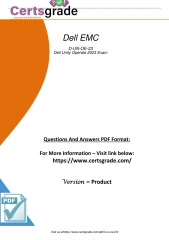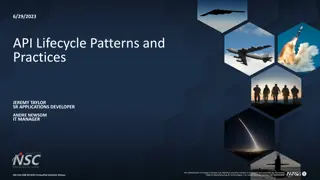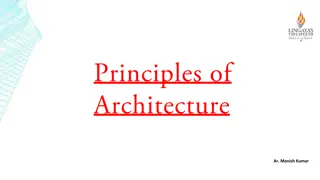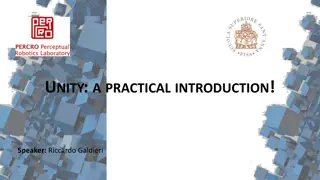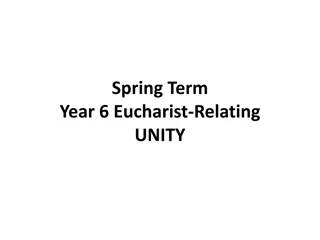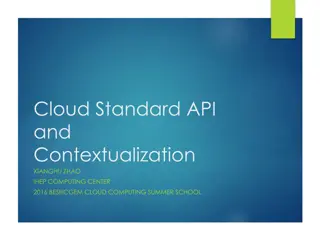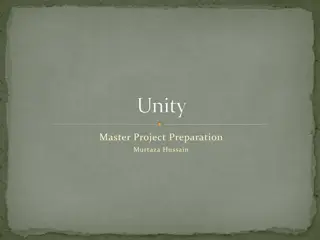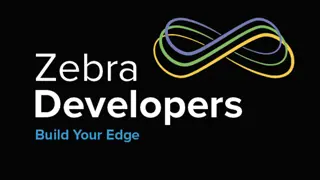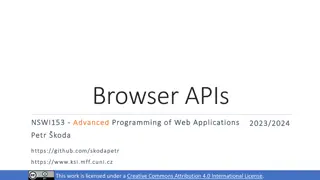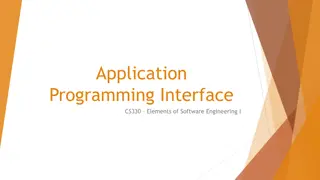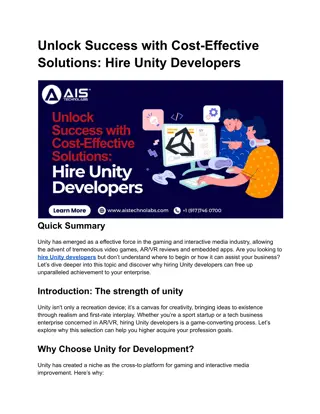Challenges in Porting Unity to New APIs
The complexities of transitioning Unity to modern APIs like DX12, Vulkan, and Metal, along with insightful quotes and considerations for shader languages, resource bindings, and porting strategies. Delve into the nuances of low-level graphics APIs and the difficulties faced in adapting existing engines while striving for optimal performance.
Download Presentation

Please find below an Image/Link to download the presentation.
The content on the website is provided AS IS for your information and personal use only. It may not be sold, licensed, or shared on other websites without obtaining consent from the author.If you encounter any issues during the download, it is possible that the publisher has removed the file from their server.
You are allowed to download the files provided on this website for personal or commercial use, subject to the condition that they are used lawfully. All files are the property of their respective owners.
The content on the website is provided AS IS for your information and personal use only. It may not be sold, licensed, or shared on other websites without obtaining consent from the author.
E N D
Presentation Transcript
Porting Unity to new APIs Aras Pranckevi ius Unity Technologies
Warm up quotes! I expect DX12 to give people an appreciation for what DX11 was doing for them (Tom Forsyth) Low-level graphics APIs are built for engine developers, not humans (Tim Sweeney) GL -> Vulkan is like complaining that your Prius is too slow, so someone gives you all the pieces of a Ferrari (Brandon Jones)
New APIs are easy when You re starting a new engine now, or Have a good console engine, or You have no customers, or It s a hobby/toy engine, or Somehow made all the right decisions 10 years ago
Bending an existing engine Nai ve change to use new APIs Shader languages (only Metal & Vulkan) Resource bindings (only DX12 & Vulkan) Threaded work creation sync, mem alloc, etc. (won t cover those)
Naive porting Same engine, same structure, same ideas Just get to whatever you had in DX11/DX9/GL Metal: Much less code than in GLES Much faster than iOS GLES DX12: Similar amount of code to DX11 Much slower than DX11
What we have DX12: HLSL No problem. Same as DX11. Metal: MetalSL Nice language, but no one else uses it. Cross-compile (currently: glsl-optimizer) Vulkan: SPIR-V bytecode ; will have GLSL -> SPIR-V tools.
What we want HLSL -> SPIR-V, possibly built on clang Analysis / codegen / upgrade / refactor tools there Extend HLSL as needed (towards C++/MetalSL like language?) SPIR-V -> LLVM -> SPIR-V xplatform optimizer Platform backends: SPIR-V to... HLSL/PSSL (D3D9/11/12, XB1, PS4 etc.) GLSL (GL/ES) MetalSL (Metal)
Why so slow? Initial DX12/Vulkan port will not run fast Lots of late decisions e.g. at Draw time, so what has changed? which tables need update? etc. That is the driver cost ! But drivers were heavily optimized already. Your new code is not.
APIs assume that You have a lot of knowledge Which things change and when Which things don t change Layouts of shader resources / constants Ideally you have that knowledge! Your existing code might not (yet)
Example Constant/Uniform buffers actually started a while ago in DX10/GL3 Ideal use case: shader CB matches C struct Works if engine & shaders are developed in sync We don t have this luxury :( People can be on latest Unity, and use shaders written 3 years ago No clear fit into ideal CB/UB model!
More assumption examples Similar now with DX12 descriptor tables you can prebuild a lot of static ones upfront Or with Pipeline State Objects you know final PSO state quite early on In current Unity code that s not quite true yet
Resource Binding, Now Descriptor tables (DX12) & CBs (DX12/Metal): Linearly allocate Mostly one-time use only Essentially everything is treated as dynamic data
Resource Binding, Soon per draw vs everything else frequencies Fast path when shader data matches what code knows about Generic it works code otherwise
Threaded Work Creation Command buffer creation and submission separate Can create from multiple threads! Just like some consoles could for a while
Current rendering (Unity 5.2) Dual-thread MainThread: high level render logic RenderThread: does API calls and a bit more Ringbuffer with our own command buffer in between Works on all platforms/APIs except WebGL since no threads there yet
Threading the renderer Just make rendering logic etc. be freely threadable Turns out: quite a lot of mutable/global state e.g. I ll just have a small cache here make it per-thread cache? thread-safe cache? stop caching? do something else? and so on
Current DX12 situation Unity 5.2 beta No big high level changes No threaded cmdbuffers All DX12 stuff is on one thread DX12 results not bad But not great yet either Will improve: Handle resources better Threaded cmdbuffers
Current general situation Right now (Unity 5.2) Not taking full advantage of new APIs yet A lot of code cleanups happened, benefited all platforms SoonTM More cleanups and threading for all platforms Better resource binding for DX12 (and 11 too!) More threading for DX12/Metal/consoles ..we re not doing Vulkan just yet, but keeping it in mind


